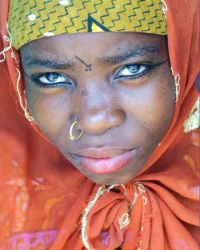Kanuri, Tumari in Niger

Photo Source:
Copyrighted © 2026
International Mission Board-SBC All rights reserved. Used with permission |
Send Joshua Project a map of this people group.
|
| People Name: | Kanuri, Tumari |
| Country: | Niger |
| 10/40 Window: | Yes |
| Population: | 110,000 |
| World Population: | 110,000 |
| Primary Language: | Kanuri, Tumari |
| Primary Religion: | Islam |
| Christian Adherents: | 0.00 % |
| Evangelicals: | 0.00 % |
| Scripture: | Translation Needed |
| Ministry Resources: | No |
| Jesus Film: | No |
| Audio Recordings: | No |
| People Cluster: | Kanuri-Saharan |
| Affinity Bloc: | Sub-Saharan Peoples |
| Progress Level: |
|
Introduction / History
The Tumari Kanuri, a name that includes the Tumari, Suwarti, Kuburi and Fachi peoples, live in and around the town of N'Guigmi, and around the Lake Chad basin in eastern Niger. Their language has its roots in the former Kanem-Bornu Empire, one of the earliest known Islamic empires in Africa.
What Are Their Lives Like?
The Koranic school system is well developed, and most Tumari Kanuri children receive religious education. The Tumari Kanuri are proud of their language and their heritage. They would prefer to use it over other languages that they use in trade relations such as Hausa or French. The Tumari raise cattle and engage in active trade with their neighbors. During dry periods, herdsmen take their cattle to Lake Chad, while the other members of the group stay at home. With their home at a crossroads of desert trade routes, men spend a lot of time buying and selling, women and girls spend most of their time in food preparation and related activities. Children are expected to assume tasks suitable to their age, including caring for younger siblings, water carrying and running errands. Visiting neighbors and friends, and expressing hospitality and generosity are important to the Tumari Kanuri. Having many friends and relationships is more important to them than accumulating possessions.
What Are Their Beliefs?
The Tumari Kanuri have been Muslims for over 1,000 years; this religion is part of their identity.
What Are Their Needs?
Only a small percentage of the eligible school-age children actually attend primary school, and of those, only a very few continue on to secondary school. In 1980 an experimental school opened in the town of N'Guigmi to teach students in their mother tongue, however, teachers were given material in a related Kanuri dialect which students did not understand. Because of this, most attempts at education and literacy in the mother tongue have not been successful. The Tumari Kanuri need materials in their own language.
Prayer Points
Pray for Tumari Kanuri elders and family leaders to have dreams and visions of the risen Christ.
Pray for the Tumari Kanuri people to have enough spiritual hunger to embrace Christ no matter what the cost.
Pray for Tumari Kanuri disciples to make more disciples.